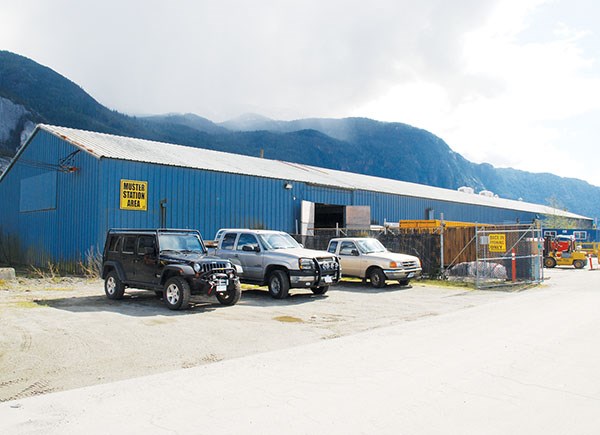A company testing technology that aims to filter carbon dioxide directly out of the atmosphere intends to call Squamish home for a minimum of 18 months.
Last September, Carbon Engineering announced it was signing a temporary lease with the District of Squamish and the oceanfront’s potential new owner Newport Beach Partnership Ltd. to pave the way for a pilot project on the site. Until the land is sold to Newport, the municipality will receive the lease income, Mayor Rob Kirkham told The Squamish Chief.
The Calgary-based company plans to set up the potentially groundbreaking equipment at the “Blue Barn” on the Nexen site. The system sucks in air, passing it through a liquid solution that filters out CO2, Carbon Engineering’s business development manager Geoff Holmes told council at a committee of the whole meeting on Tuesday, Oct. 28. What makes this technology unique is that it doesn’t have to be placed on a smoke stack, he explained.
“We are going after the 60 per cent [of CO2] that doesn’t come out of those facilities,” Holmes said.
As the market moves out of its financial crisis, companies are turning their attention back to climate change and carbon pricing, Holmes said. Carbon pricing is a system in which those that emit CO2 are charged for their emission, making equipment that eliminates carbon dioxide a valuable undertaking for companies, he noted.
“Really what we are going after are these transportation fuels,” Holmes said.
Carbon Engineering hopes to sell the filtered CO2 back to these companies to be used in a process called carbon dioxide flooding. The method of injecting CO2 into old oil reservoirs is employed to help increase the output of oil when a reservoir’s pressure is depleted. It is also considered as a CO2 emissions offset, Holmes said.
Carbon engineering anticipates the technology will capture 500 tonnes of CO2 per year — the equivalent of taking 200,000 cars off the road.
The company intends to engage local contractors during the construction of the pilot project, Holmes said. Officials anticipate 20 to 25 people will be required during the building phase and up to 16 people will be onsite during the operation phase. Carbon Engineering has been in discussions with the University of British Columbia to continue research once the initial testing is completed, Holmes noted. BC Research is aiding with the pilot project. The innovation centre is always hunting for areas to accommodate its projects, he said.
Mayor Rob Kirkham said he hoped this pilot project would put Squamish on their radar for future projects. The community does have some “big chunks of land” that fit with these types of projects, Coun. Ted Prior said.




